Key takeaways:
- Online comments significantly affect artists’ emotional well-being and creative processes, necessitating the ability to discern constructive feedback from negativity.
- A strong online presence is crucial for musicians to engage with audiences, control their narrative, and create a supportive community.
- Adopting a growth mindset allows artists to transform negative criticism into valuable lessons, fostering resilience and artistic improvement.
- Establishing a support network among fellow musicians provides encouragement and shared experiences, helping to navigate the challenges of receiving negative feedback.
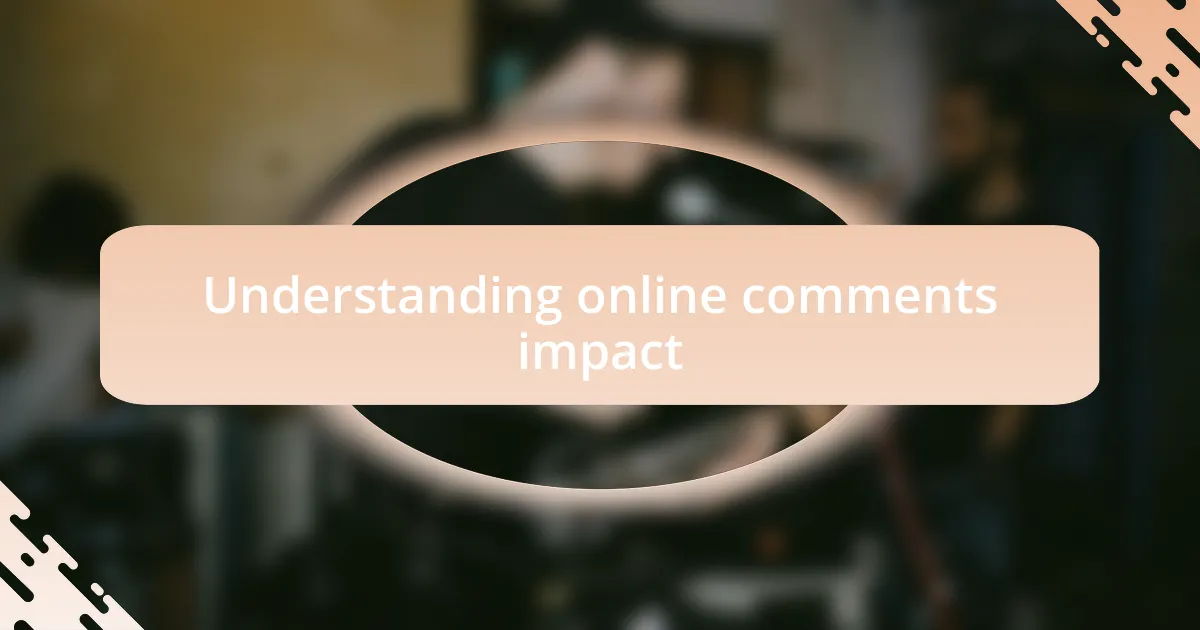
Understanding online comments impact
Online comments can have a profound impact on both artists and audiences. I remember sharing a new track on social media and receiving a barrage of mixed feedback. While some opinions encouraged me, others felt like daggers, sparking self-doubt and frustration. Isn’t it interesting how a few words from a stranger can resonate more than the support from those who know you?
When I see a negative comment, I often question its validity. Is this criticism constructive, or is it merely a reflection of the commenter’s mood? An offhand remark can linger in my mind longer than I’d like to admit. I’ve learned that separating my emotional response from the actual content of the feedback is crucial, allowing me to focus on genuine insights rather than fleeting negativity.
It’s essential to acknowledge how comments shape the narratives surrounding music. For example, I’ve witnessed fellow musicians either thrive or falter under the weight of online critiques. The difference often lies in how they choose to interpret that feedback. Are they using it as fuel for improvement or allowing it to dim their creativity? Understanding this dynamic can significantly influence one’s approach to sharing art in the digital age.
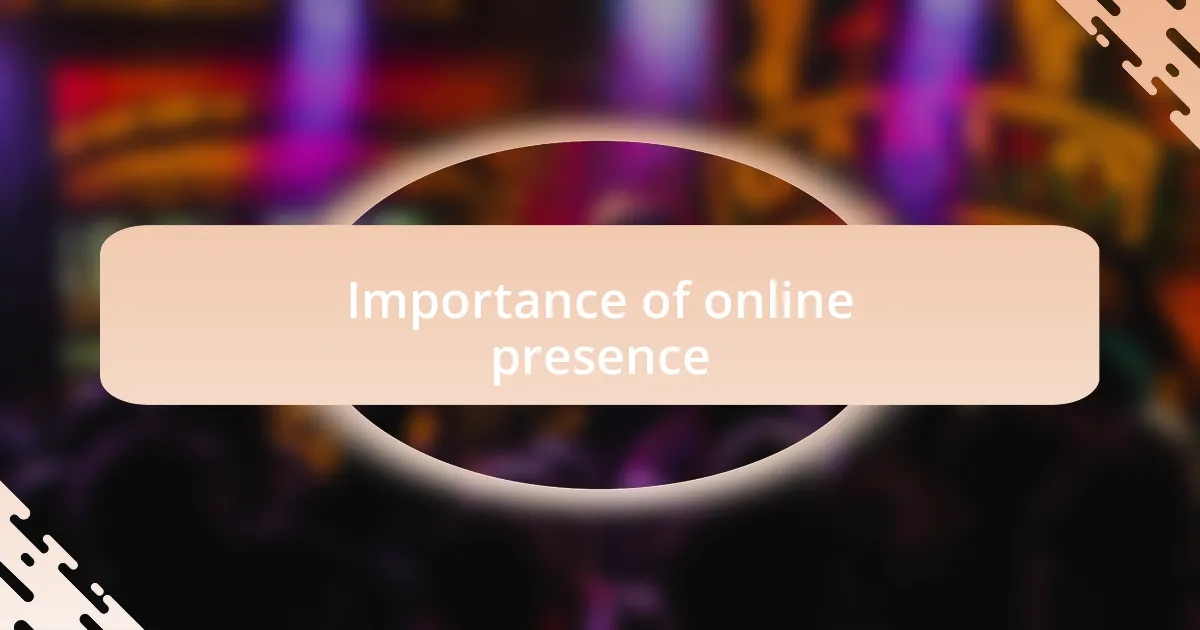
Importance of online presence
Online presence is not just a luxury for musicians; it’s a necessity. I distinctly remember the time I released my first EP without a solid online strategy. The result? Minimal engagement and a sense of isolation. Would you believe how much those early days of silence affected my motivation? It wasn’t until I dedicated time to building my online presence that I began to truly connect with audiences.
Engaging with fans online can transform your musical journey. I once shared a behind-the-scenes video of my recording process, and the feedback was astonishing. Fans felt invested in my journey, providing support that propelled me forward. Have you experienced that moment when a simple post fosters a community who genuinely cares about your work? It’s validation and inspiration wrapped into one.
Additionally, a strong online presence allows musicians to control their narrative. I learned the hard way that allowing negative comments to define my brand was detrimental. Instead, I started sharing stories behind my songs, inviting listeners to share in my experiences. This shift not only buffered the impact of criticism but also reinforced my identity as an artist. Isn’t it empowering to shape how people perceive your music?
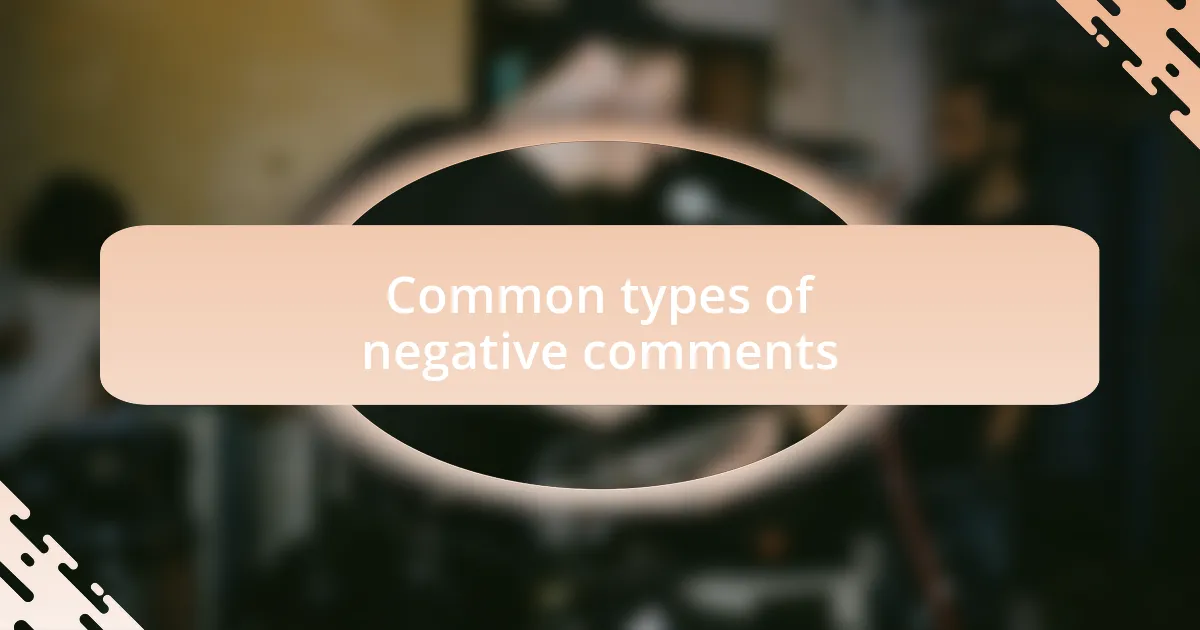
Common types of negative comments
Negative comments online can take many forms, and each type carries a different weight. For example, I often encountered dismissive remarks—those that simply said my music was “boring” or “unoriginal.” Such comments stung because they felt like a personal attack, yet they taught me a crucial lesson. Instead of letting them derail my confidence, I used them as fuel to experiment, pushing me to refine my sound and explore new genres.
Then there are the trolls who thrive on stirring up negativity. I once had a commenter relentlessly mock my vocal style. At first, it was disheartening, but I later realized that engaging with this type of negativity was futile. It helped me focus on constructive criticism instead, reminding me to differentiate between genuine feedback and just unkind noise aimed at getting a rise out of me.
Some of the most challenging comments are the vague, yet cutting observations, like, “You’ll never make it.” These unhelpful critiques can linger in your mind, making you doubt your talent. I remember grappling with this when starting out; it felt like an uphill battle. However, I eventually learned to view such comments not as roadblocks but as indicators of my growth journey. How can we let negativity define us when it often reveals our deepest motivations?
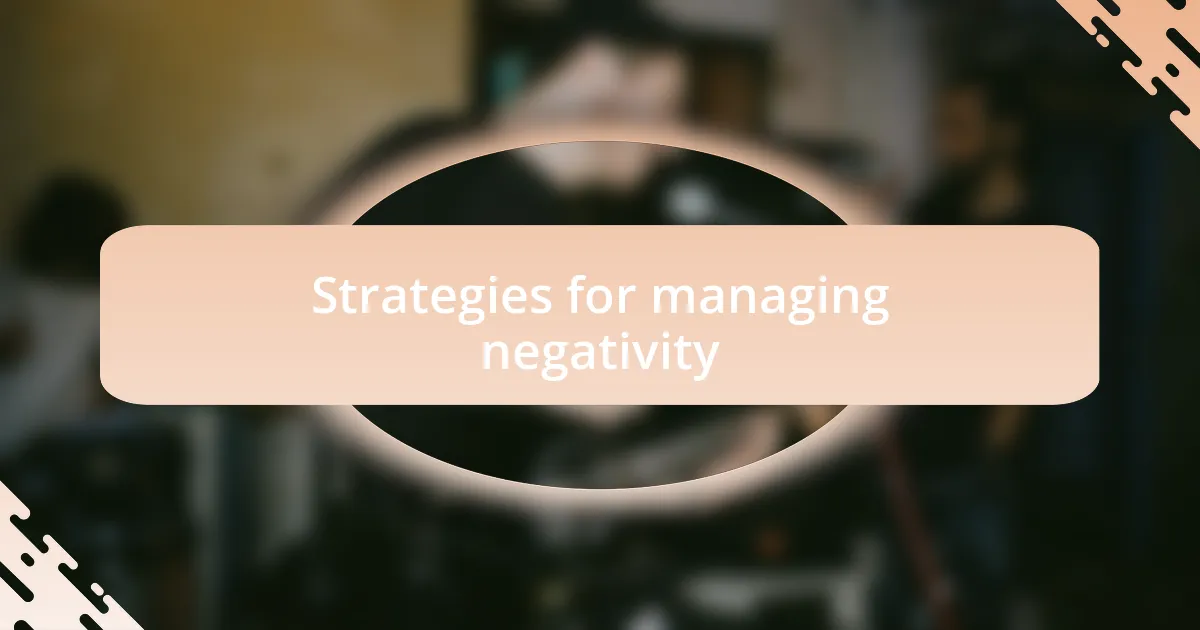
Strategies for managing negativity
When negative comments start flooding in, it’s essential to take a step back and breathe. I recall a time when a particularly harsh review sent me into a spiral of self-doubt. Instead of responding right away, I took a moment to reflect on what would be constructive. This pause helped me discern what was truly valuable in the criticism, allowing me to focus on improving my craft rather than feeling attacked personally.
Another effective strategy I adopted was the power of community. Connecting with fellow musicians and sharing our experiences created a support network that’s invaluable. I remember discussing some tough feedback with a close friend who is also an artist; his perspective helped me see that we all face negativity at some point. This camaraderie reminded me I wasn’t alone and that others’ experiences could guide me through my own challenges.
Lastly, embracing a growth mindset can redefine how we perceive negative comments. I learned to ask myself, “How can this comment help me grow?” instead of dwelling on the sting it caused. By actively seeking out the lesson in each critique, I transformed negativity into stepping stones for artistic growth, ultimately empowering me to create more authentically. What if we could view every negative comment not as a setback but as a chance to evolve?
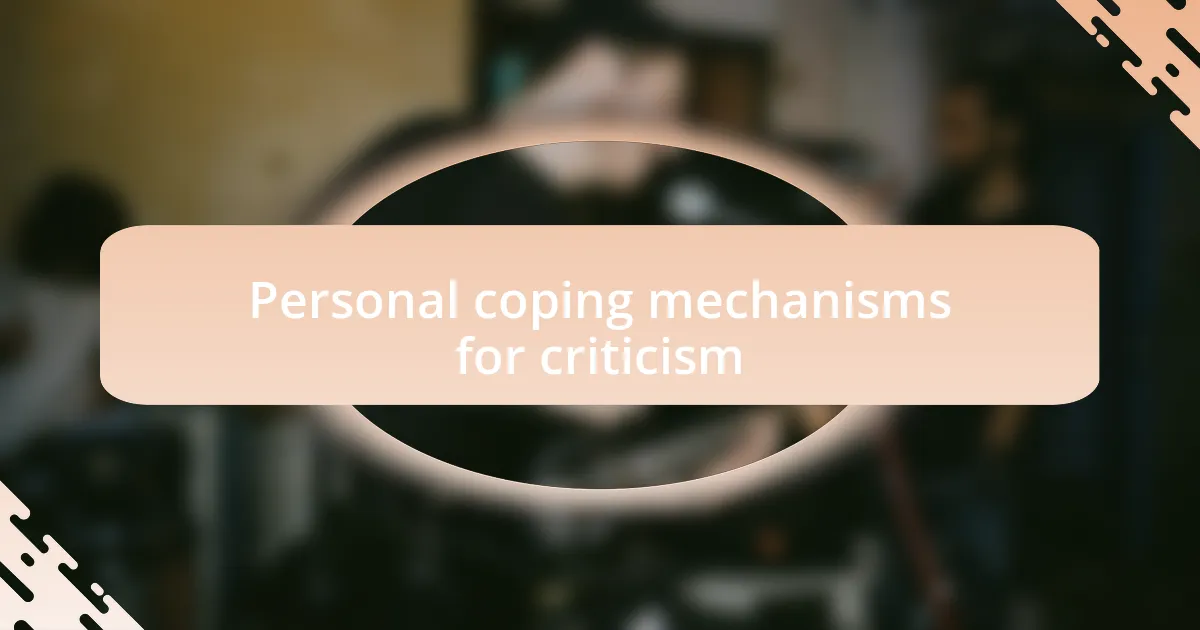
Personal coping mechanisms for criticism
Sometimes, I find it helpful to practice self-compassion during moments of criticism. In one instance, after receiving an unfriendly comment about a song I poured my heart into, I took time to remind myself that everyone has different tastes. It dawned on me that my worth as a musician isn’t determined by a single opinion; instead, I learned to honor my creativity and cultivate resilience in the face of negativity.
I also turn to journaling as a coping mechanism. Writing about my feelings allows me to process the sting of criticism more thoroughly. One particular evening, after a rough day filled with harsh responses, I sat down with my notebook and poured out my thoughts. By the time I closed that journal, I had transformed my frustration into inspiration, leading to new musical ideas I never would have explored had I let the criticism defeat me.
Engaging in mindfulness practices has significantly changed how I handle negative comments. I recall a moment when I decided to meditate before responding to feedback instead of reacting impulsively. That time spent in stillness helped me approach criticism with clarity and calmness, proving that sometimes, the best way to respond is simply to breathe and ground myself before engaging with negativity. How often do we let anger dictate our responses, rather than taking a moment to reflect?
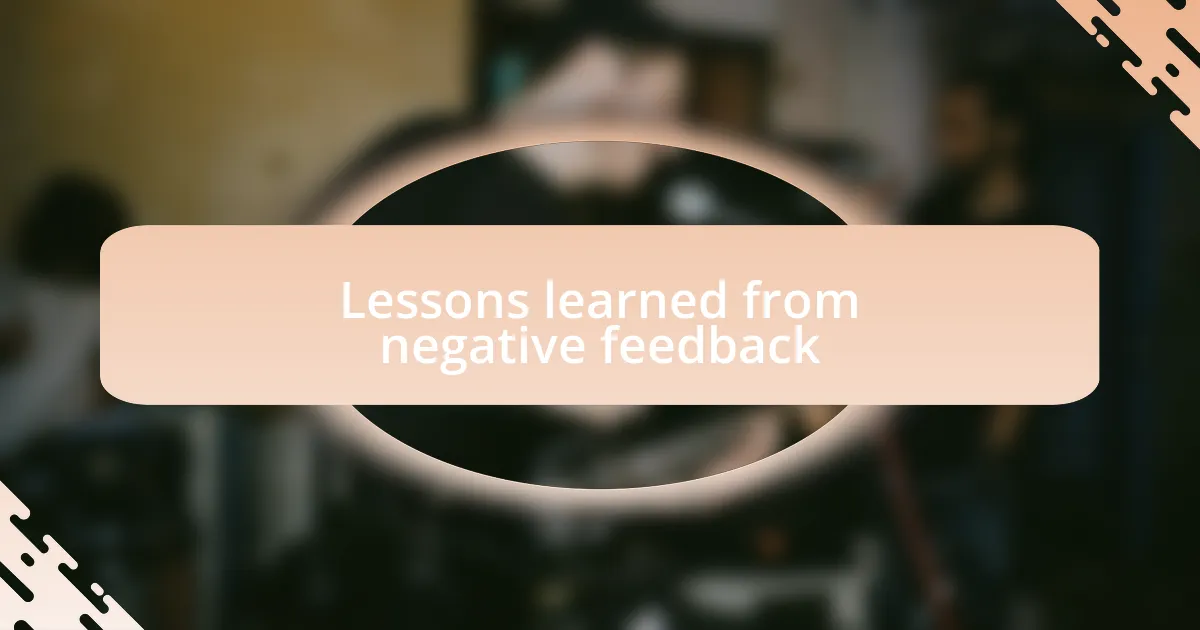
Lessons learned from negative feedback
Negative feedback often holds valuable lessons wrapped in a seemingly harsh package. I remember a night after releasing a new track when a comment criticized the mixing of my music. Initially, my emotions flared, but upon reflection, I realized that this feedback pointed out a weak spot I hadn’t noticed myself. It was a reminder that even established musicians refine their craft continually.
Through this experience, I learned the importance of adopting a growth mindset. Rather than viewing negative commentary as a personal attack, I started seeing it as an opportunity for improvement. One of the most impactful lessons I gleaned was to seek constructive criticism actively. In a rehearsal session one day, I openly asked my bandmates for their honest opinions on a song arrangement. Their differing perspectives ended up enhancing our sound, an outcome I wouldn’t have achieved without embracing feedback.
I’ve also discovered that sharing these experiences with fellow musicians fosters community and connection. After a particularly critical review, I had a heart-to-heart with a friend in the band. We laughed over our shared experiences of unwarranted negativity while discussing how to rise above it. This camaraderie not only strengthened our resolve but also emphasized that we’re all navigating the same challenging waters in the music industry. How often do we realize that our struggles with criticism are shared?
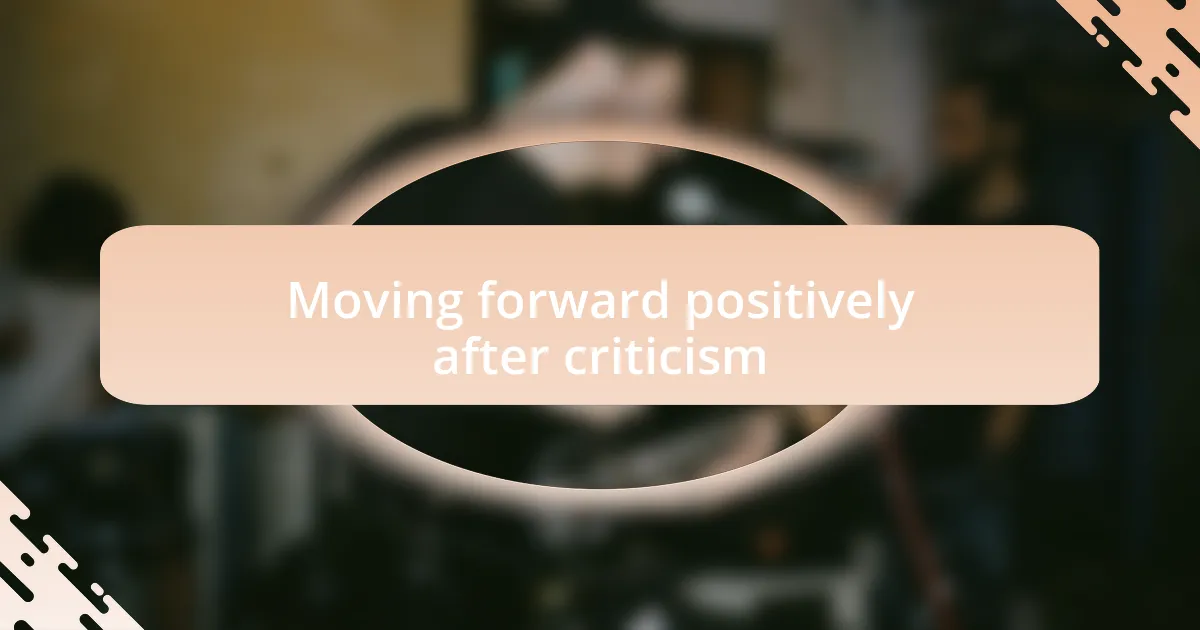
Moving forward positively after criticism
Moving forward after facing criticism requires a shift in mindset. I had a moment when an online reviewer slammed a song I was particularly proud of. Instead of sulking, I took a step back to analyze their points. Their criticism opened my eyes to aspects I had overlooked, which made me realize that every piece of feedback, no matter how harsh, could drive my growth as an artist.
It’s remarkable how transforming negativity into motivation can invigorate your creative process. I recall a particularly tough week where negative comments piled up, but instead of feeling defeated, I channeled that energy into writing new music. Each lyric became a cathartic response to the criticism, allowing me to express my emotions and refine my craft. Have you ever turned criticism into a powerful muse for your work?
Building a support network is another key to moving forward positively. When I felt overwhelmed by negative feedback, I reached out to fellow musicians for encouragement. We shared our own stories of resilience, and it was comforting to realize we all face the same struggles. This exchange not only helped me cope but also reinforced the notion that criticism is a shared experience, making it easier to keep pushing forward and stay true to my artistic vision.